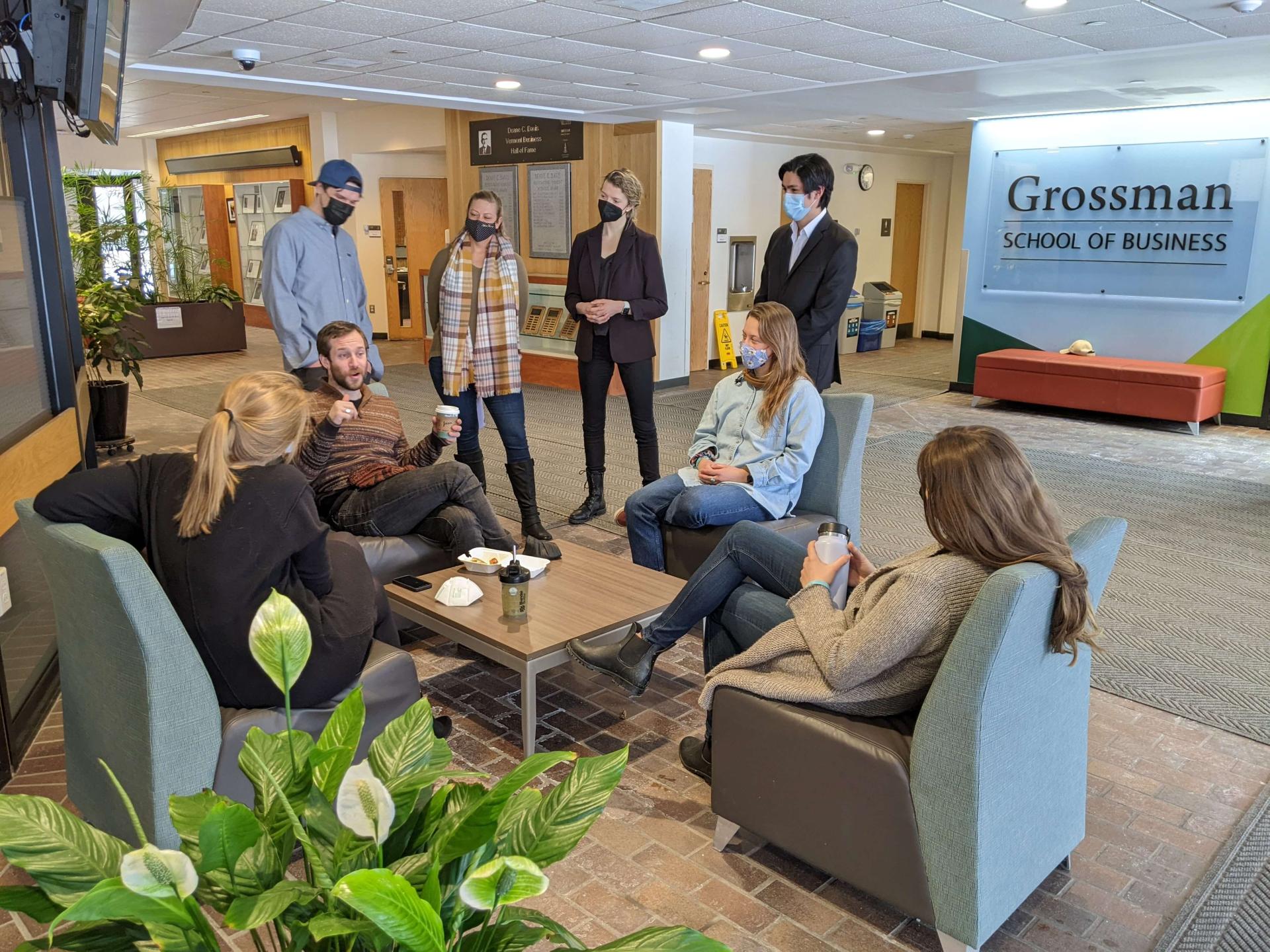UVM’s Sustainable Innovation MBA (SI-MBA) program was designed to stand apart from the traditional MBA programs of other elite universities. SI-MBA is designed with sustainability at its core. With an emphasis on long-term strategy, stakeholder input, and re-embedding purpose in business, SI-MBA creates an option for prospective students who are driven to create positive impact in their communities.
SI-MBA is a 1-year intensive program, which begins with foundational studies and culminates with a capstone practicum project. Facilitated by the SI-MBA faculty and staff, practicum projects are an opportunity for students to gain industry experience by partnering with local, national, and international businesses. This year, students are joining Microsoft, Clorox, Burton, SunCommon, Morningstar, and a variety of other companies. The students are placed on equal footing with their industry peers, providing opportunities for collaboration and co-creation in the pursuit of real solutions.
When Sanjay Sharma, Ph.D., stepped in as Dean of the Grossman School of Business in 2011, he set about restructuring UVM’s conventional MBA program in a rapidly changing world. The revamped program (initially called the Sustainable Entrepreneurship MBA) graduated its first cohort of 20 students in 2015. Since that inaugural group, the SI-MBA program has grown in stature. SI-MBA has been ranked in Princeton Review’s Top Green MBA List for 5 years running (taking the #1 spot in 2018, 2019, and 2020). The program garnered similar accolades from Corporate Knights’ Better World MBA rankings, listing in the top 10 globally in 2018, 2019, 2020, and 2021. SI-MBA is also accredited by the Association to Advance Collegiate Schools of Business (AACSB), a distinction held by less than 5% of business programs worldwide.
While the SI-MBA program’s reputation has grown, so has its student body. The current Class of 2022 includes a diverse group of 45 students. Members of the cohort have traveled to SI-MBA from across the continental US, and abroad from Columbia, Argentina, the United Kingdom, New Zealand, and India. The vast majority of the cohort had professional experience prior to joining SI-MBA, in broad disciplines including marketing, engineering, sustainability, education, the non-profit sector, the performing arts, food systems, and much more.
The diversity of students’ prior experience is an invaluable component of the program. While the distinguished faculty provide a thorough foundation in finance, business strategy, marketing, and economics, an equal portion of learning comes during the huddled group discussions in Kalkin Hall over class breaks. Students bring dynamic conversations to the classroom (and beyond) every single day. This combination of formal training and spontaneous networking creates a rich learning environment. “As someone who came into the program with no formal experience or education in business,” says Vanessa Chumbley, former Stage Manager for the Houston Ballet, “I am blown away by how much I am learning. I love that we're not just learning 'business as usual', but rather – how business can be transformed for the better as a positive force in our global society."
As the name suggests, the SI-MBA program is built around a culture of innovation, adaptiveness, and growth. Program Director Caroline Hauser, M.B.A, and Academic Director Chuck Schnitzlein, Ph.D., coordinate to improve the program and bring in new elements every single year. They solicit feedback from the student body through formal and informal channels, monitoring the pulse of the cohort and responding to student needs. This year, the SI-MBA program expanded and formalized extracurricular tracks in topics like Renewable Energy and Product Development. The program engages with “Innovators in Residence” and its growing alumni network to bring in new speakers and networking opportunities. Most recently, SI-MBA engaged Professor Kim Nolan to lead a new seminar series promoting open debate and discussion over complex topics related to diversity, equity, inclusion, and climate justice.
Students often take the initiative to start their own collaborative projects. This year, students in the Class of 2022 re-launched the Sustainable Innovation Review, a public blog that elevates student voices to speak to emerging issues in sustainability, social equity, and finance. Others joined SIMPACT, an organization led by current and former students who engage with local Vermont businesses to provide pro bono sustainability consulting services. Still other students have competed internationally in sustainable business competitions, engaged with faculty to co-author case studies, and hosted business forums with domestic and international business leaders.
Dean Sharma and the rest of the faculty have created a stellar program that provides a strong core curriculum. The diversity and drive of its students elevate the program even further. SI-MBA fosters an environment where initiative is rewarded, opinions are respected, and collaboration is valued over competition. This ethos isn’t lost on the students. In reflecting on her experience this year, Carly Joos asserts: “I love how much SI-MBA facilitates community and collaboration. Whether it's inside or outside the classroom, I always feel supported by the members of this cohort and learn so much from them every day. It's so important to feel this connection and support throughout such an accelerated program."
As we, the Class of 2022, prepare to (re)enter the workforce, it’s helpful to reflect on the success the SI-MBA program has attained over the past eight years. UVM has been rewarded for establishing a business program that engages with sustainability head-on, while other MBAs continue to view sustainability as a burden. Further, UVM’s culture of inclusion and innovation has created a productive learning environment with an engaged student body. SI-MBA is setting an example for business at-large, while training its future leaders in the process.
>>Connect with Taylor R. Smith (SI-MBA Class of 2022)
